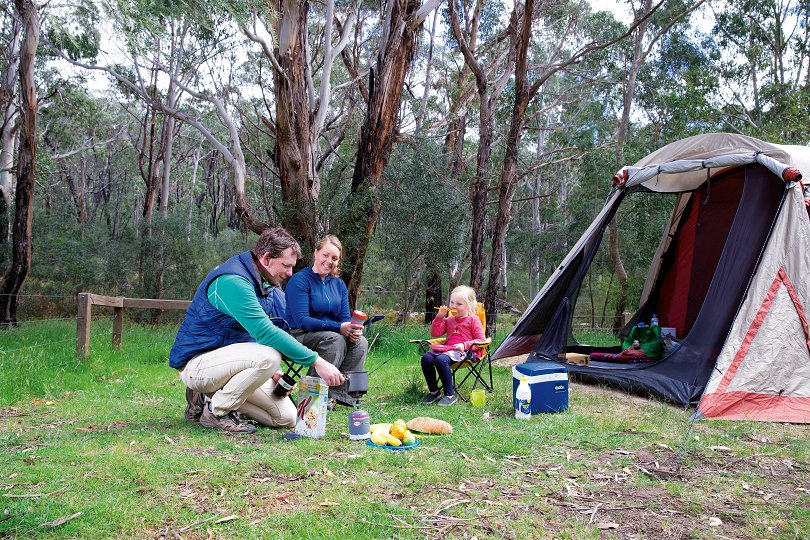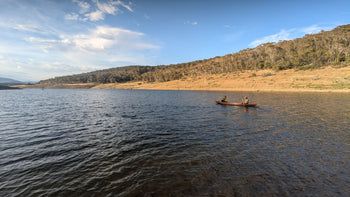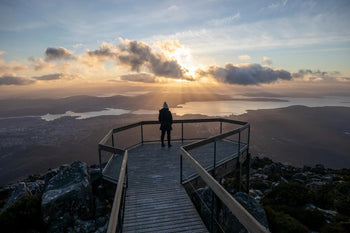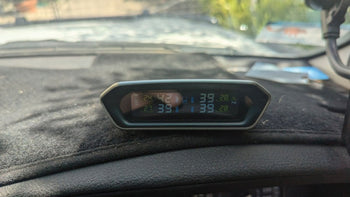

Keeping your children safe around camp may seem simple, but there are a few hidden dangers of which to be aware.
Camping with loved ones is a great way to relax, spend quality time together and let your hair down. For your youngest family members, camping is a chance for them to have a bit of freedom and explore the great outdoors — interacting with nature instead of staring at a screen. However, having access to so much freedom in the great outdoors — at times away from phone reception and civilisation — comes with some risks.
Keeping your kids safe around camp may seem simple, but there are a few things to consider to ensure that everyone gets home safe and sound. Here are some safety tips to consider on your next family camping trip.

Be prepared
When it comes to keeping your kids safe while on the road, there’s a range of things you can do before you’ve even left home. Firstly, sit your children down to discuss where you’re headed on your adventure and why. Setting expectations before you’ve left home can alleviate a lot of stress for all involved and it helps the kids understand what’s coming and what to expect. Some children can get anxious about the unknown, so it helps to prepare them mentally for what’s ahead. It can also prepare them for some long travel times in the car and avoid some of those ‘Are we there yet?’ questions.
In the days leading up to your trip, do a thorough shop for everything you may need for the first few days of your trip, not just food and drinks, but essential items such as insect repellent, sunscreen, sick bags and a first aid kit.
When packing, make sure the little ones have all the clothes they might need for changing weather conditions such as hats, sunglasses, rain jackets, swimmers and appropriate footwear. Kids love to get dirty while camping too, so consider your access to laundry facilities if you’ll need to do a load of washing every few days.
Before heading off, a thorough check of your camper and tow vehicle should be under taken to ensure everything is in working order and to mitigate the risks of any mechanical issues while you’re out on the road. The last thing you want is to be trying to repair something with less than patient kids waiting in the background.
Prepare for long drives by packing the car with lots of entertainment options for the hours ahead such as books, board games and electronic devices for movies. And there’s nothing wrong with a good old-fashioned game of I Spy or similar to keep small minds busy on long travels. Have water and some healthy snacks available to avoid too many unnecessary stops and, let’s face it, highway service centres are expensive and an easy way to blow your holiday budget.
Establish some rules
They say that being prepared is half the battle, and the same is true when it comes to keeping your kids safe. Before you set off on your journey, it’s important to establish some special camping rules or guidelines to help your kids stay in check, thus creating a safer environment for everyone. Most campgrounds have their own rules to keep everyone safe within the confines of the parks, but you could apply some of the following rules to your own campsite:
- Make sure your kids know where they can and can’t go. This applies to campgrounds and bush camps alike. Kids love to explore, so make sure you set the boundaries first.
- If you have more than one child, make sure they know to always stick together if you/your partner aren’t with them.
- Teach your kids to respect the boundaries of other campsites. While your kids might be having the time of their lives, fellow campers do not always appreciate having kids running through their outdoor living areas or accidentally unplugging leads to their camper.
- Don’t leave bikes or toys around as potential hazards for you or any other campers.
- Establish noise rules — kids often wake early and want to start playing, but other campers might not be as keen to have bikes zooming past them from dawn to dusk.
- Teach your kids not to touch any cables or leads without asking a parent or guardian first. Electrical safety is no joke.
- Make sure they’re always in the tow vehicle with you or standing safely in sight when moving or repositioning your camper/caravan.

Emergency situations
When something dangerous and unexpected happens, the worst situation you can be in is having everyone around you panic. It’s therefore extremely important to teach your kids how to react and behave in an emergency. Give them a few examples of possible accidents that may happen when camping and role play how they should handle it. It may seem over the top, but if something happens to you and your partner isn’t around (or vice versa), your kids could end up saving your life.
The first step is making sure all children know to call 000 in case of an emergency, and that they know where a landline or mobile phone is to do so. While your teens might benefit froma basic first aid lesson, ensuring all your kids know where the first aid kit is kept while you’reon the road is wise. They might not be able to use what’s in it, but they can fetch it in the case of an emergency.
Another useful lesson to teach your children, especially if they get lost, is to memorise their full name, your full name and your mobile phone number. It will be much easier for someone to help them if know these details. Make them recite these three things back to you before you let them go off on their own.
Fire safety rules
Unfortunately, Australia’s landscape and climate create the perfect conditions for the ignition and spread of bushfires. An uncontrollable fire can start in a number of ways, and among them is from live campfires which were not properly extinguished. Learning about fire safety is essential for all Australians and it’s prudent to start that education young.
Statistics indicate that child burn injuries during camping and caravanning are predominantly inflicted by ashes and coals left from the night before. A University of Queensland report states that roughly 70 per cent of serious campfire burns to children are caused by hot ashes and coals rather than active flames. Children should be closely monitored around the campfire as well as teaching them some essential rules.
Before lighting a campfire, it’s important to check if there are currently any fire restrictions and if campfires are permitted in the area you’re in. When teaching your children how to build a campfire, instil the basics early. For example, they should choose a spot well away from trees, bushes and tents. A designated firepit is the best option, however, if there are no pits, a dug-in fire is the best option. Start by building a small fire, using kindling and smaller bits of wood.
Never use accelerant to start a campfire. The good old-fashioned structure of kindling graduating to larger pieces of wood is more than adequate. Accelerants make it difficult to control a fire and can lead it to spread and rage beyond its intended perimeter.
Having a bucket of water handy is also a good idea, particularly when children are nearby. An adult should always extinguish a fire, but it’s important that kids can see adults role model this behaviour and be able to replicate it in an emergency.
Once you’ve lit a campfire, it is your responsibility to ensure the fire is put out after use. Never leave a fire to burn out overnight, even if the conditions seem mild enough. Victoria’s Country Fire Authority (CFA) advises that campfires should be extinguished using water, not sand or dirt. Water cools the fire faster and minimises the danger of others burning their feet in the area the next day. Just as children can be involved in starting the fire, they should be involved in extinguishing it. This is a great opportunity to explain to children that it is an important responsibility to put a fire out.
If a campfire gets out of hand, make sure you teach your kid(s) not to panic and to move away from the flames so an adult can extinguish it. Remember to also teach your child about the best steps to take if they come across a fire (flee, tell an adult and call 000). And remind them the importance of never re-entering a fire area for any reason.

Water safety
One of the most beautiful aspects of Australia is its vast and stunning coastline, not to mention its beautiful lakes, rivers, swimming holes and waterfalls. Destinations with water are meccas for campers — particular in summer. Swimming, surfing, jet-skiing, boating, fishing, canoeing and rafting are among the myriad of water activities that go hand in hand with camping and caravanning and when you have small children near water you must be vigilant constantly.
No matter their age or how competent they are at swimming, children should never be left unattended around water — whether it’s the relative safety of a public swimming pool or at the beach or a country river where they are hidden dangers beneath the surface. While it might seem tempting to let older children play at the caravan park pool while you sneak in an hour or two reading a book, it is generally frowned upon by proprietors.
Younger children must always wear a life jacket when they are in, on or around large bodies of water — boating accidents can often happen in the blink of an eye and the results can often be tragic.
If you have very young children, also be aware that they can drown in just a few inches of water. An unattended bucket, an empty Esky with melted ice in the bottom, even a dog’s water bowl can all pose a potential risk around the campsite for littlies.

Poisonous plants
When you’re out in the bush or even unfamiliar campgrounds, suddenly there are a lot more plant species to be aware of that may cause harm to your kids. Reactions to poisonous
plants, such as oleander which you can find in many gardens, vary widely and can range from nausea, dizziness and diarrhoea to shortness of breath, irregular heartbeat, a coma and even death. Other poisonous plants that can be found around Australia include angel’s trumpets, deadly nightshade and black bean. Even the nettle family will cause a painful skin irritation if you come into contact with it.
Teach your children the importance of not trying to ingest any new plant discovery while out in the bush. Tell them that no matter how fun or edible a plant species may look, the chances of it being poisonous to humans is high and should not be eaten or even tasted.
If your child might have been exposed to a poisonous plant, immediately call the Poisons Information Centre on 131 126 for advice — open 24/7 Australia wide. If you need to take your child to the hospital, try to take a piece of the plant with you for identification purposes.
Wrap up
A camping holiday with the family — whether it is a weekend away or an extended adventure — is a special time for bonding, exploring and discovering new things. It’s a great learning experience for kids and adults alike. Keeping your little ones safe while on this adventure is an utmost priority for parents and it is surprising how quickly things can go wrong. From falling out of a tree to accidentally ingesting a poisonous plant, it pays to be prepared.



